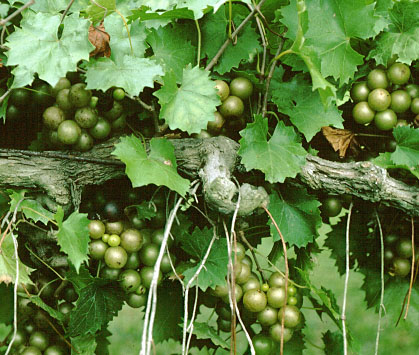At the 2015 Annual Meeting of the American Association for Cancer Research (AACR), two new, promising studies regarding the health benefits of muscadine grape extract were presented, the first in the “Prevention Research, Chemoprevention″ lecture, and the second in the “Carcinogenesis, Prevention, Intervention, and Modulation of Carcinogenic Risk” lecture:
- “Prevention of breast tumor growth by an extract from the muscadine grape“
- “Muscadine grape extract reduces lung carcinogenesis in female mice exposed to 3-methylcholanthrene in utero“
The first study abstract said, “The current study examines the preventive effects of a proprietary muscadine grape extract (MGE) on breast cancer formation. The proliferation of actively growing human ER+ or triple negative breast cancer cells was significantly reduced by MGE from grape seeds or skins with an associated decrease in phospho-ERK, suggesting that MGE inhibits breast cancer cell proliferation through a reduction in activation of growth-promoting kinases. … these studies suggest that MGE reduces both breast tumor burden and multiplicity, through decreasing proliferation, angiogenesis and fibrosis, suggesting that extracts from muscadine grapes may represent a novel nutraceutical for the prevention of breast cancer.“
The second presentation reported, “… MGE [muscadine grape extract] significantly reduced tumor burden in female mice by approximately 48% as compared to the tumor tissue found in control mice drinking regular water (12.4 ± 1.9 g versus 6.5 ± 1.2 g, n = 26-32, p = 0.014). In addition, tumor multiplicity was higher in control mice as compared to MGE-treated animals (6.8 ± 0.4 observed tumors versus 4.2 ± 0.5 observed tumors, n = 26-32, p = 0.0001). Tumor tissue sections from mice administered MGE had a significant decrease in proliferating cell nuclear antigen as compared to tumors from control animals (22.4 ± 1.8 versus 14.2 ± 1.3, p = 0.0009), suggesting that in part MGE reduces tumor burden by decreasing tumor cell proliferation. … MGE significantly reduced blood vessel density in lung tumor tissue as compared to female mice drinking regular water (20.5 ± 2.2 versus 11.3 ± 1.3, p = 0.0012), suggesting that the grape extract inhibits angiogenesis. These results indicate that MGE reduces both tumor proliferation and angiogenesis, leading to a decrease in tumor burden and multiplicity.“
These findings are similar to previous study results, except these studies were conducted on mice, whereas previous studies were conducted on cells, in vitro. Hopefully human clinical trials will be conducted soon. The first study was conducted by Patricia E. Gallagher and E. Ann Tallant, both faculty at Wake Forest Univ., and the second study was conducted by Brooke E. Porter, Joseph E. Moore, Mark S. Miller, E. Ann Tallant, and Patricia E. Gallagher.
